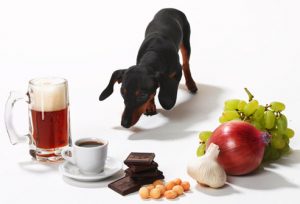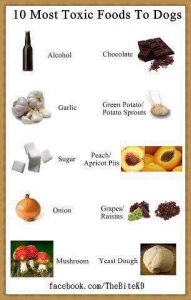These Human Foods Are Toxic to Your Dog
 What Did The Dog Just Eat?
What Did The Dog Just Eat?
by Cate Burnett, RVT
While chocolate, avocados, and macadamia nuts may sound like lovely treats to you – but allowing your dog to have a little nosh on those foods can not only make her sick, it can be fatal if she over indulges. Lea Ann Goettsch of Green Dog Delicacies & “The Bite” posted a handy summary of foods toxic to dogs on Facebook – we’ve included a copy below, along with a little additional information.
Avoid the following foods when preparing a homemade diet or giving your dog treats:
Yeast Dough
Raw yeast dough can rise in your dog’s stomach, causing painful gas in the intestinal tract, possible blockages and ruptures. Once the dough has risen and is fully cooked, you can give your pet small bites of bread as long as the treats don’t constitute more than 5 to 10 percent of his daily caloric intake.
Grapes and Raisins
According to the ASPCA Animal Poison Control Center, grapes and raisins are known toxins in dogs, having caused numerous cases of poisonings, even though veterinarians have yet to pinpoint the specific toxin involved. Dogs typically experience diarrhea, vomiting, lethargy and eventually kidney failure that can lead to death. While many dogs can eat the occasional grape without incident, the ASPCA recommends never feeding your pet a large amount and NEVER feeding raisins, as even small servings of raisins have been linked to toxic reactions.
Onions, Garlic, and Chives
These vegetables and herbs can cause intestinal distress and lead to hemolytic anemia, a disorder of the red blood cells that can affect your dog’s spleen, liver, and lymph nodes. While cats are more affected than dogs, any animal eating large quantities of these particular foods, or their associated powders, is susceptible.
Chocolate, Coffee, Caffeine
Methylxanthine, a type of stimulant, found in chocolate and coffee can cause severe digestive and neurological problems when ingested by your dog. Both theobromine, found in chocolate, and caffeine, found in coffee, are considered classes of methlyxanthine, and can induce diarrhea and vomiting, excessive thirst and urination, panting, hyperactivity, abnormal heart rhythm, tremors, seizures and, if left untreated, even death. The darker and less sweet the chocolate, the more dangerous it is for dogs.
 Macadamia Nuts
Macadamia Nuts
The macadamia nuts, commonly used in cooking and baking, can cause weakness, depression, vomiting, muscle spasms, and increased temperature in your dog. Symptoms usually appear within 12 hours of ingestion and last approximately 12 to 48 hours.
Avocado
The fruit, seeds, leaves and bark of the avocado can cause severe diarrhea and vomiting in your dog, and can be especially harmful to pets of the smaller breeds. The avocado contains persin, a fungicidal toxin similar to a fatty acid that, while generally harmless to humans, has negative effects on dogs.
Eggplant
The skin, fruit, and seeds of the eggplant contain toxins that can cause severe diarrhea, vomiting, tremors, seizures, and heart arrhythmias in your dog. The seeds are particularly harmful as they contain cyanogenic glycosides that can result in cyanide poisoning.
Alcohol
Dogs absorb alcohol quickly and are prone to toxic reactions including diarrhea, vomiting, central nervous system depression, tremors, breathing difficulties, decreased coordination, abnormal blood acidity, coma and even death. Never give any form of alcohol to your dog, including the kind found in certain food products.
Milk and Milk Products
While milk and its by-products, such as cheese, butter, and ice cream, are not necessarily considered toxic to dogs, canines are lactose intolerant and feeding these foods to your dog can cause intestinal distress, including vomiting and diarrhea.
Salt
Just like it does in humans, eating excessive amounts of salt can cause excessive thirst, increased urination, and possibly sodium poisoning in your dog. Too many salty foods result in symptoms including vomiting, diarrhea, depression, tremors, elevated body temperature, seizures and even death.
Note: If you suspect your dog has eaten any of the above foods, please note the amount ingested and contact your veterinarian or the ASPCA Animal Poison Control Center at (888) 426-4435.
And the good news…although there are a few items we definitely want to avoid, there are plenty of human foods that you can share with your dog. So go ahead and have fun cooking for – and even sharing a snack with – your four-legged friend, now that you are better informed about what ingredients to avoid.
